Search Results for: 10 tips from
********
10 DAYS LEFT TO HIGH CONCEPT SHOWDOWN!
SUBMISSION DETAILS HERE!
********
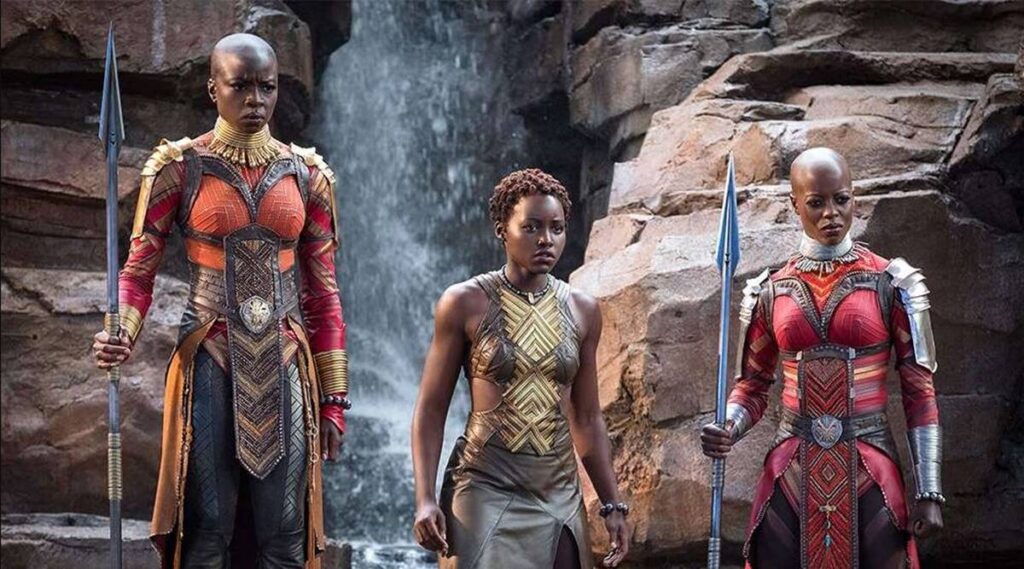
It’s looking like the loss of Chadwick Boseman is affecting Wakanda’s homeland more than Disney was prepared for. Black Panther 2 finished with just 67 million dollars in its second weekend. For reference, the first film took in 111 million on weekend number two.
It’s an indication that word-of-mouth is, much like the film’s central villain, below sea level. In all fairness, it probably should be. The picture’s bite is more minnow than shark, even if its running time is more bloated than a blue whale.
They should’ve made the movie lean like a dolphin and mean like a piranna so that people didn’t have so much time to sit in the theater and think, “Why is this girl pretending to be Iron Man?” Or, “When did the world population become 97% women and 3% men?”
Hollywood is trying its best to ignore the negative outlook, flexing on the film’s half-a-billion dollar global box office. And I don’t blame them. As dysfunctional as the Marvel-audience relationship has become, Marvel is the only theatrical game left in town. If it sputters, what’s left? A Fast and Furious franchise led by a 60 year old? We don’t even have Star Wars movies anymore!
I’ll tell you the movie that’s going to temporarily take care of this issue. A little flick called, Avatar: The Way of Water! I honestly believe this film is going to make Hollywood rethink how they approach the theatrical movie business. James Cameron actually took the time necessary to make sure EVERY frame of his film looks perfect.
![]()
Marvel, meanwhile, employs the opposite approach. They film their movies on conveyer belts. Their action scenes are shot with second unit directors. Their special effects are farmed out to Thailand.
Cameron is there every day making sure he controls each aspect of his vision, even if that takes a lot more time. You can see the results in the trailer. It looks beautiful. The film is going to clean up. I wouldn’t be surprised if it challenged The Force Awakens for that 2 billion dollar global take.
Once that happens, Hollywood is going to have to really think about what it takes to bring audiences to the theater. Because the one adjustment that they haven’t made in this new “Giant Movies Only” theatrical era, is taking your time in order to create the best product possible. They’ve been pumping these things out like Big Macs. And audiences are starting to say, “We want sirloin. Not frozen beef.”
Another movie that isn’t doing so hot is She Said, the film about the two reporters who wrote a Harvey Weinstein expose that helped start the #MeToo movement. The film was released wide and took in only 2.3 million dollars.
I’m just going to say it. Nobody wants to watch movies like this. We have our real life in real life. We don’t need it in our movies. We don’t go to movies to be depressed, to be reminded of depressing things. I can’t, for the life of me, understand why anyone would’ve thought this movie was going to sell more than five tickets.

Universal is out there saying they “had” to make this movie cause it was the right thing to do, or some such nonsense. This new guilt-greenlighting that I see in Hollywood is one of the stranger developments in the market. I never thought I’d see the day when studios purposefully made movies they knew were going to bomb.
I suppose someone could’ve talked themselves into She Said making money via an Oscar run. But I don’t see it. It’s depressing subject matter. It’s stuff we’ve been bombarded with every day in the news for four years. Why would we then want to pay for it? “Oh man, 15 website articles touting #metoo wasn’t enough for me today. I need to pay 20 bucks to see more!”
It’s also confusing. When the Weinstein scandal broke, it was Ronan Farrow getting all the publicity. For the few people in middle America who might’ve been potential audience members here, they’re probably saying, “Who are these chicks?” They want to see the movie about the guy who *actually* broke the case.
If you’re going to shoot for an Oscar run, I suggest doing what The Menu did. The Menu is stylishly directed. It’s got great actors in it. It’s a sophisticated enough story to get Oscar voters intrigued. And, oh yeah, IT’S ALSO ENTERTAINING. The one ingredient Hollywood forgot when coming up with, “She Said.”
As you guys know, The Menu was a favorite script of mine. I’m happy to see it do fairly well this weekend. True, it only made 9 million bucks. But, honestly, I think that’s what you’re topping out at these days if you don’t have either a 200 million dollar budget or an easy-to-market horror film. Everything else seems to finish in the 8-12 million dollar opening range.
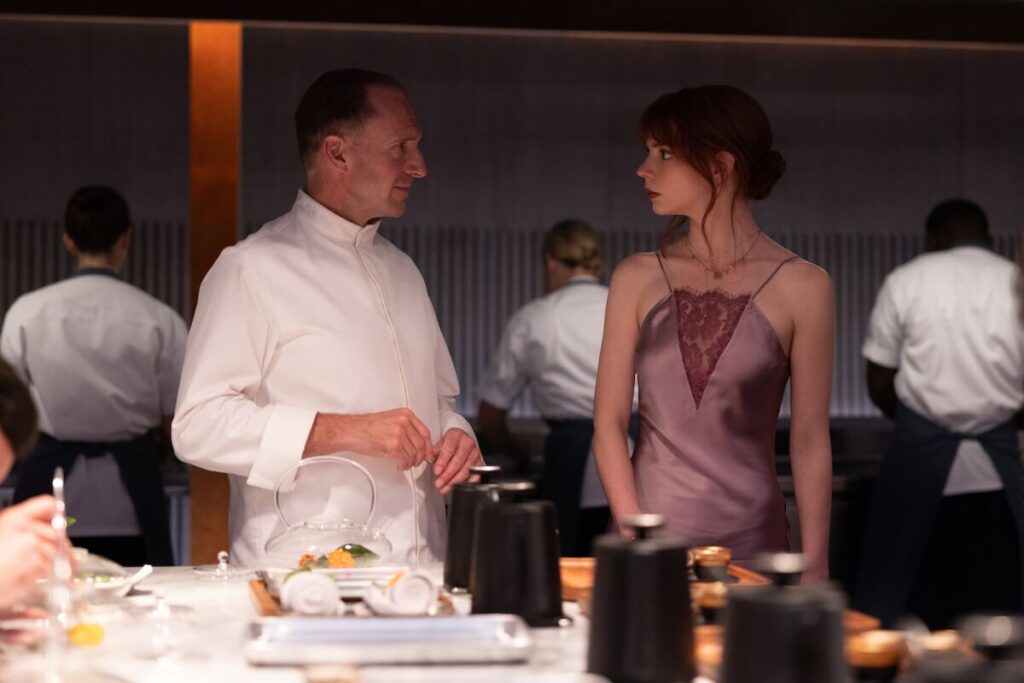
I’m not going to pretend that these types of movies aren’t 3 years away from debuting on streaming. But if you’re looking for a really fun story and a really well-written script, don’t go see Black Panther 2. Don’t go see She Said. See The Menu.
If you have no interest in going to the theater and just want to watch something good, I suggest firing up HBO Max and watching No Country For Old Men. I watched the film for dialogue tips (Yes, I’m STILL WORKING on the dialogue book – It’s coming! I promise!) and became so into the story, I ended up completely forgetting about dialogue.
The movie is the epitome of what I preach on the site – KEEP IT SIMPLE! It’s the simplest of simple stories, told with a likable protagonist, a super-compelling antagonist, and a bag of money. Sure, a couple of other people enter the story later on, but, at its heart, it’s two strong characters and a dramatic situation.
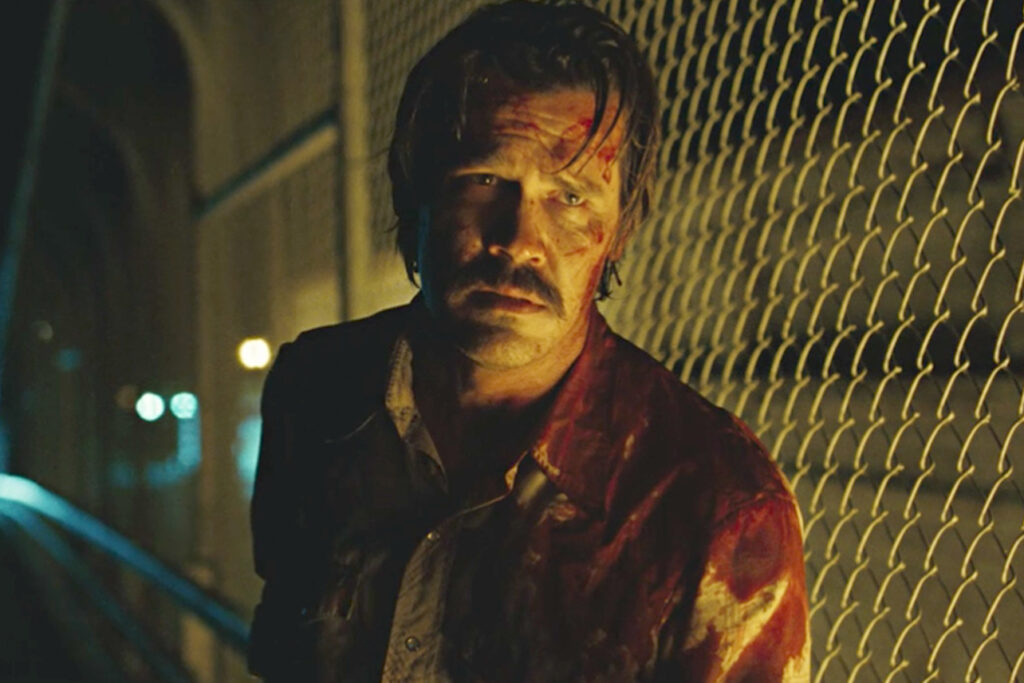
Something that struck me about the film was that, traditionally, the problem with this type of setup is that the villain has the primary goal (to catch the protagonist) leaving the protagonist with the weaker, more reactive, motivation (their job is to, essentially, wait and react to the antagonist). But Llewelyn’s character is written in a surprisingly active fashion. He knows he’s being chased by a de facto Terminator, so he’s always constructing plans to trick Anton (the bad guy) whenever Anton catches up to him.
For example, Llewelyn knows Anton will probably figure out what motel room he’s in and, therefore, buys the room next to his and sleeps there instead. He then waits for Anton to inevitably show up to his original room so he can figure out who’s chasing him and escape before this psycho can hurt him.
That’s a big part of what’s so fun about the script. It’s a chess match. But it’s an ACTUAL CHESS MATCH. So many writers don’t have the capability (or the discipline) to come up with genuinely clever moves from each character. This script is full of them.
One of my favorite moments is Llewelyn sitting in a dark hotel room in the middle of the night, terrified that Anton is coming. And then, finally, Llewelyn sees two dark shadows in the thin streak of light at the bottom of the door. But before he can do anything about it, the feet shadows disappear, and then, ten seconds later, the hall light goes dark. Anton went and turned it off specifically so that Llewelyn would not be able to see anything in that slit of light underneath his door. What other writer thinks of details like that??
But it really is amazing how captivating the movie is considering that it boils down to such a simple premise. I would love to have the Coen Brothers who made this movie return. They’re always at their best when there’s a bag of money involved. Although half the Coen team is coming out with a pretty good script himself, in Drive Away Dykes.
Did anybody see Black Panther, The Menu, or She Said this weekend? What did you think?
EDIT: QUICK THOUGHTS ON IGER RETURNING TO DISNEY – Since this just happened as I was about to go to bed. I never understood why Iger left in the first place. He was doing the best job leading the company since Disney himself. He was still young. Yet for some reason all Disney could talk about was replacing him. It didn’t make a lick of sense. So, in that sense, I’m not surprised he’s back.
The question is, what caused this dramatic change in leadership? No matter how many things you can knock Disney for, they have still done better than every other studio. They are still miles ahead of everyone else. And while Netflix is stagnant with their service, Disney Plus is still adding people. Didn’t they just add another 12 million subscribers last quarter?
I’m wondering if this is strictly a Marvel problem. Is it because all the Phase 4 movies were bad except for the one not made by them (Spider-Man)? Is it because Chapek allowed a group of people who hadn’t written anything to steer a 150 million dollar show in She-Hulk? Are those the reasons Chapek is out? I’m sure we’ll learn more in the coming days. But wowzers, this is huge news.
Say hello to the movie that’s going to win Florence Pugh her first Oscar.
Genre: Drama/Thriller
Premise: A maid on the autism spectrum unexpectedly finds herself wrapped up in a high profile murder at the fancy hotel she works at.
About: This book was sent out last year, before publication, to Hollywood, where Florence Pugh got hold of it and quickly signed on. The book was officially published this year and quickly rose to the New York Times best seller list. This is author Nita Prose’s first novel. Just to show you how important it is for writers to read, Nita was a long time editor before she finally broke out with this book. She is from Canada. I will try not to hold that against her.
Writer: Nita Prose
Details: 290 pages

It is becoming harder and harder to make non-gigantic IP properties theatrical releases. Anything that has even a hint of drama and genuine acting in it is dismissed as a streaming movie.
The only way these movies can now become studio releases is if they go TO-THE-NINES on the production. They get a big actor or actress. They give the film 3x as much money as a movie like this would normally cost. They build the most amazing sets and costumes imaginable. And they get a high-level director who directs the s**t out of the movie.
I’m talking every shot is a piece of art.
That’s the only way something can stand up to a Wakanda Forever or a Fast and Furious. You’ve got to see the trailer and it’s got to physically look amazing.
They should do that for The Maid because it deserves it. It’s a really fun story with a great star-making role.
Molly Gray works at an upscale hotel in New York. She’s a maid. And not just any maid. She’s the most dedicated maid you’ve ever watched clean. All she cares about is cleaning. All she cares about is leaving every room in perfect condition.
A big reason for this is that Molly is on the spectrum. She is autistic and while she doesn’t understand the complexities of human interaction, she understands how to make any room look and smell brand new. This is in large part because of her grandmother, who was also a maid. Unfortunately, her grandma, who was her only friend in the world, died recently.
What begins as a normal day at the hotel turns very un-normal. While cleaning the room of the hotel’s highest profile guests, the Blacks, Molly finds Mr. Black dead on the floor. She immediately alerts the hotel manager and that’s when the craziness begins.
Long story short, Molly has been friendly with Giselle Black, the wife of the dead man, who becomes suspect numero uno. Terrified for her friend, Molly tells the cops that she doesn’t know Giselle well, which they quickly find out is a lie. Molly then goes to her crush, the guy she considers her best friend at the hotel, bartender Rodney, for help. But what she doesn’t know is that Rodney may be involved in this somehow. And he’s not afraid to throw Molly under the bus if it means saving himself.
When Molly then becomes the number one suspect, she will have to team up with a local lawyer and get several of the hotel workers to covertly admit that they had a hand in this. But with her unique condition, will she be able to pull it off? Or will she, for one final time, be taken advantage of?

The way actors used to hunt for that big Oscar gold was to take on the role of a mentally challenged person. From Forrest Gump to Sling Blade to I Am Sam to Radio to Me Time. Some had success getting that Oscar, others didn’t.
These days, Hollywood’s become so terrified of Twitter attacks that they don’t want to get anywhere near the “R” word. So they’ve come up with a replacement – autism. Autism allows for characters battling difficult mental conditions. However the characters are still fully functional and, therefore, okay to portray.
We saw this in Silver Linings Playbook. We saw it in The Accountant. We saw it in The Imitation Game. This is one of the best character strategies screenwriters can use because actors will fight each other in gladiatorial arenas to land one of these parts. And it’s rising star, Florence Pugh’s, turn, to put on the armor.
Now, not every autistic role is created equal.
Where most writers go wrong is they only have the barest understanding of autism. They build their character around other autistic characters they’ve seen on TV and in film. Sometimes this can work if you’re writing a comedy (Sheldon in The Big Bang Theory). But if you’re writing a drama, you better understand autism as well as the greatest doctors in the world. Because in order for these characters to work, they must feel authentic.
That’s why The Maid works. And that’s why it rose to the top of Hollywood’s priority list – so much so that they went to their number 1 “It” girl to see if she’d do it. And she loved the character so she was in.
The great thing about autism (I may be the only person who’s ever written that) is that it enacts what I call “The Protection Principle.” The Protection Principle is when the reader feels protective over the main character. They want to make sure they’re okay. They get angry when others take advantage of them.
It can easily be said that the reason Forrest Gump is so popular is because of the Protection Principle. We love him so much that we want to protect him from the big bad world and all the people trying to take advantage of him in it.
The Maid may be the only story that leans more heavily into the Protection Principle than Forrest Gump. I can’t remember the last time I wanted to shield someone from pain more than Molly. She’s such a sweet girl. She’s so naive. Everyone’s taking advantage of her. And it very well might send her to prison for the rest of her life.
What’s so great about this book, though, is that the desire to protect our heroine grows with every chapter. By the time the cops have angrily arrested and accused her of all these things, we’re so charged up we want to drive down to our closest governmental establishment and demand justice. That is until we remember that, oh yeah, this is a fictional story.
The book is a great reminder that writing any story is about getting the BIG THINGS RIGHT. Concept. Character. Plot. We get so wrapped in the minutiae and, while I’m not saying the details aren’t important, they’re not nearly as important as the big three.
I might even take that a step further and say, even if the only thing you get right is the main character, as long as you get it REALLY REALLY RIGHT, you will write something of value that people will want. Especially in this business because it’s all about getting that big actor to sign on and bring buzz to your project so it can get made and, if you nail your main character, that’s exactly what will happen.
What works so well about Molly’s autism and the Protection Principle is that it introduces a level of dramatic irony. It’s established early on that Molly is obsessed with Rodney, the bartender. She loves everything about him, from the way he smells to the way his forearm muscles ripple when he places his hand down on the bar table.
But as Molly describes Rodney and how much she would love to make him her boyfriend, we see things that she doesn’t. We notice that he calls her “special” to others (“He called me special,” Molly beams. “I knew there was something between us.”). We notice that he’s being nice to her, but in a slightly patronizing way that she’s misinterpreting as romantic interest.
In other words, we know early on this guy is probably bad news. So we want to protect Molly from him. But poor Molly can’t read any social cues so she doesn’t see what we see. And it makes us frantic to keep reading and hope that she figures it out before it’s too late.
There’s a chapter late in the book where Molly needs help with this gun that she’s helped sneak out of Giselle’s hotel room, and she decides to ask Rodney for his assistance. And we’re sitting there screaming, “NOOOOOOOO!!! That’s the last person you want to tell!” And, of course, Rodney then uses that information to frame Molly.
Honestly, the plot itself isn’t anything special. It’s a got a few twists and turns. But the reason we’re so invested is because the character is so great. And the character is so great because of the autism choice, the authenticity through which that condition is explored, and the byproduct of that autism, which is the ignition of the Protection Principle.
Those three things kept me turning the pages and, when I finished, I had no doubt that Pugh was winning an Oscar. It’s a done deal already. Just give it to her now. I know that’s never been done before – that an actor is given an Oscar before she starts shooting the movie – but I promise you this is the one time we can break that rule.
[ ] What the hell did I just read?
[ ] wasn’t for me
[ ] worth the read
[x] impressive
[ ] genius
What I learned: This is an AMAZING book to read to learn how to make a character likable. Not just because of the autism thing. But Molly’s best friend in the world, her grandma, died recently. The head maid at the hotel, Cheryl (who Molly’s nicknamed “Cherylnoble”), goes into Molly’s rooms ahead of her to always steal her tips. A former boyfriend took all of her and her grandmother’s money. When others take advantage of our hero, we love our hero more than anything. And because Prose is a such a good writer (how could she not be with that last name?), it all feels very authentic. None of it is desperate over-the-top “please like my hero” writing. I honestly can’t remember the last time I loved a character this much.
What I learned 2: All of the above only works if the protagonist still has a positive attitude towards life. It doesn’t work if your hero feels sorry for themselves and gives up. We love this character so much because in spite of all these things that happen to her, in spite of a job that might depress others, she still gets up every day and has the most positive optimistic attitude in the world.
What I learned 3: A dead body and a really unique main character is one of the most reliable setups for a story out there.
What I learned 4: NO EXCUSES! Nita’s job took up her entire day so she got up at 5am every morning and wrote for 4 hours before her day job. It took her 5 months to finish a first draft.

As someone who reads a lot of scripts – scripts of every level – I’m lucky enough to be one of the few people who will read a top level professional screenplay and then, just a few hours later, a script from a brand-new writer.
This allows me to study screenwriting from a unique perspective, as it allows me to see, almost in real time, the differences between pro level work and beginner level work.
I was doing a lot of that this week. Reading beginner scripts then professional scripts then beginner scripts again. And I kept encountering the same mistake over and over by the beginners. Which is that they don’t exhibit any quality control over their ideas.
They instead have something I call “I Can Do It Too” Syndrome.
“I Can Do It Too” Syndrome is an evil infectious virus that most beginners don’t realize they’re sick with. It’s the act of liking something from other movies so much that they want to show that they can do it too.
As I’ve stated before, almost every screenwriter’s motivation, whether they’re aware of it or not, is to rewrite the movies they fell in love with as kids and young adults. If they liked Star Wars, they want to write their big space opera epic. If they liked Die Hard, they want to write that big action thriller with a fun one-liner spitting protagonist. If they liked Step-Brothers, they’re determined to write a fun goofy two-hander comedy.
While imitation is the sincerest form of flattery, I can assure you that this syndrome is KILLING YOUR SCREENWRITING GAINS.
Because whether you realize it or not, every person who reads your script is comparing it to the movie you’re inspired by. And guess what? Your script is losing. You’re never going to write a similar movie to a classic movie and beat it. You’re never going to write a space epic better than Star Wars. You’re never going to write a movie about a guy trapped in a military base taken over by bad guys where he has to save his wife that’s better than Die Hard.
You are only going to fall short in the eyes of the readers. They’re going to read your script and whether they say it to your face or not, they’re thinking, “This is just a not-as-good ripoff of [whatever your favorite movie is].”
But for some strange reason – and I put myself in this category when I was starting out too – beginner writers are unable to see the similarities between their script and the movie they’re copying. To them, that movie was an *inspiration* for their script. It doesn’t matter that the main character is basically the same. It doesn’t matter that 75% of the set pieces are similar. It doesn’t matter that a lot of similar dialogue lines are used or that a lot of supporting characters seem eerily similar to that favorite movie of theirs. In their minds, it’s different *BECAUSE THEY WROTE IT*.
And that’s the big mistake. Assuming that because the story is coming from their fingertips as opposed to someone else’s, it can’t be mistaken for any other movie. The mere fact that they wrote it is what makes it unique.
But that’s not reality.
Readers have a very broad filter for what they consider “familiar.” They think way more scripts are familiar than different. That’s because there have been a lot of great movies over the years. So they’re always thinking, “This feels too much like The Exorcist.” “This feels too much like The 40 Year Old Virgin.” “This feels too much like The Hunger Games.”
I can assure you, one of the most common feelings a reader has is, “This script is just like [so and so].” And beginners are the most susceptible to this because they don’t yet know it’s a common problem and therefore don’t know to look out for it. Again, they think that the mere fact that they’re writing the movie means it will automatically be unique no matter what.
So, if you want to gradate into the intermediate level of screenwriting, one of the easiest ways to do so is to squash this mistake and never make it again. Cause if you’re writing original ideas with original execution, you’re ahead of 90% of the people out there.
How do you achieve this?
With an Idea Bouncer.
Your screenwriting brain is a club. Just like any other club, you need to be careful about who you let inside. That’s the bouncer’s job. He’s there to only let original ideas into your club. He has to screen every single idea that arrives and ask, “Is this original enough to come inside?”
You’re going to do this on two fronts. The first is the more important front – the concept itself. The good news is, if this is a strong highly original movie idea, it wards off a ton of potential problems down the line. An original movie idea can withstand a solid chunk of cliched choices. On the downside, if you let a bad movie idea into your club, there’s virtually no way to save the night.
The other front is all the individual creative choices within your script that need to populate the club (aka, your screenplay). This includes the main character. The supplemental characters. The plot developments. The setting. The tone. The scene choices. The set pieces. Every one of these choices must line up in front of the club and your bouncer needs to determine if they’re original enough to come inside.
The more unoriginal (or “familiar) ideas that get past your bouncer, the lower the probability that your script will feel unique, even if you have a unique concept. Because if you’re writing a bunch of scenes that I read all the time, that will neutralize your strong concept.
I can’t emphasize enough how big of a problem this is in screenwriting. I suppose I understand why new screenwriters make this mistake. You can’t prevent a mistake that you haven’t yet learned is a mistake. However, I cannot, under any circumstances, accept non-beginner screenwriters making this mistake. If you’ve written more than five scripts and you haven’t even hired an idea bouncer for your club yet, that’s unacceptable.
I’m bringing this up because I read tons of screenplays and most of them are boring due to the fact that the writer isn’t even trying to be original. They’re just repurposing their favorite movies and their favorite scenes under a new title and a slightly different story and thinking that’s going to do it. But these scripts are the easiest ones to dismiss because they’re uninspiring and forgettable.
Now, I realize this is an imperfect argument. Cause you can bring up The Equalizer and John Wick and say, “Those movies sure seemed familiar, Carson.” Yes, it’s true. They do.
But those movies are outliers. First off, The Equalizer doesn’t count cause that movie was being made in-house and hired a writer to do what they wanted. It wasn’t a spec. And John Wick was destined to be a straight-to-VOD-cemetery crap-fest until the directors repurposed it into a slick action flick with game-changing fight choreography.
Let’s not forget that everyone in town not only passed on the John Wick script, they laughed at it. And while that may sound like they were the ones who made the mistake, it’s pretty hard to look at that script before the film and think, “Yup, this is going to be a billion dollar franchise.”
Point being, you can’t use the most successful outliers in history as an excuse for why your script gets to be cliched. You’re operating as a one-man or one-woman business and that business is your screenplay. It’s got to speak for itself. Which means your idea bouncer has to be the most discerning in the business. He’s got to be the bouncer who’s looking at that 9 out of 10 but not letting her in because her outfit looks like it was cobbled together at the Salvation Army.
I want you guys to take this seriously. I want your bouncer to have an extremely high bar. I want you to give him a name. I want you to share that name in the comments. I want you to give him a backstory. You can share that too if you want. Heck, I want you to give him an accent and tell me which actor is going to play him in his biopic. I want him to feel as real as yourself. Because he’s got one of the most important jobs in the world – he’s quality control over your ideas. He needs to be hard on those ideas because I can guarantee you, we, the reader, are going to be a thousand times harder on them than him.
Now go write something original and great.
Genre: Horror/Adventure
Premise: A former Hawaiian warrior turned werewolf is recruited to join a mysterious pack of werewolves.
About: It appears that Aaron Guzikowski really likes wolves. He created the show, Raised by Wolves. And it turns out, during the planned Monsterverse slate of horror movies, he wrote a draft of The Wolfman. Afterwards, Ryan Gosling would come to Universal and pitch his own version of The Wolfman, which had a Christopher Nolan approach to the property whereby he would treat it very realistically. “Nightcrawler” was given as a tonal comp. Yesterday’s writers, Lauren Schuker Blum and Rebecca Angelo, would go on to write that draft for Gosling. To be clear, today’s draft was written by Aaron Guizikowski (Prisoners, Raised by Wolves, Papillon).
Writer: Aaron Guizikowski
Details: 120 pages

Wolf Week continues here on Scriptshadow.
Monday, we looked at the classic horror film, An American Werewolf In London. Tuesday, we had that Big Mean Orange-Haired Wolf. And today, we have a reimagining of the classic film, The Wolfman.
So, as those who read my newsletter know (e-mail me at carsonreeves1@gmail.com to sign up), our first Monsterverse script, for Van Helsing, turned out to be pretty awesome! And so, can a full moon strike twice in the same month? I thought that was impossible.
Or, wait. A full moon actually stays full for two nights, right? So maybe it can strike twice! Unless the second night of the full moon is only like a 95% full moon. In that case, it’s not a real full moon. And since I don’t know much about werewolf mythology, I don’t know how much of an effect that has on werewolf changism. Is a 95% werewolf still a werewolf. Or is just a werewol?
The year is 1826. We’re on Molokai Island, Hawaii (I’m guessing they were targeting The Rock or Jason Mamoa for the role). The prince of this land, Deo Kekoa, is hanging with his homies when a fiery ship sails right up to the beach.
Deo and others try to break through the hull where they hear people screaming. But when they finally succeed, they’re attacked… by a werewolf. Deo is able to kill it but, unfortunately, he’s been bitten. And since his father has seen werewolves before, he knows Deo will turn into one. So he banishes Deo.
We then wake up in 2017 in Iceland, where Deo is now a bodyguard for high-profile clients. Over the years, Deo has learned how to turn into a werewolf on command. Unfortuantely, he still has no control over his true turning, which happens every full moon.
Deo is responsible for guarding a businessman named Edmund Razmus, who works for something called the “Frankenstein” Corporation. He takes Edmund out into the middle of nowhere in order to truly isolate them from threats but it isn’t long before a group of werewolves attack and kill Edmund. Deo does some research on these werewolves and learns that they live in Hamburg, Germany. So off he goes.
Once there, he meets with the alpha of the group, a steely wise businessman named Jacques Delancre, a billionaire shipper. Also, Deo realizes, Delancre is the man who owned the fiery ship that crashed on his shores that day.
At first, Deo wants to kill him. But there’s something magnetic about Delancre that Deo has never experienced before and he soon finds himself curious about this wolf pack. For so long, he’s been alone. It feels good to finally have a family. Delacre teaches Deo to stop resisting his animalistic urges and, instead, embrace them. He wants Deo to be more wolf than man.
The next thing you know Deo is helping Delancre with a heist. The Frankenstein Corp has a lab in the Swiss Alps and they’re doing tests on a former member of the pack. Because Deo has the special ability to turn into a werewolf whenever he wants, Delancre needs him for this rescue mission. Deo agrees, but in the process, worries about if he’s being seduced for, ultimately, nefarious purposes.
Um.
This script is awesome.
I mean, I don’t know what’s going on over at Universal. But they’ve gotten two of the best big-budget scripts I’ve read in a long time and they’re not going to do anything with them. It baffles me.
Cause this was a really cool script.
There were four things that stood out. One, the mythology. It’s really well-researched and constructed. Every werewolf here has a deep backstory as they come from a different time period and different part of the world. And the stuff about the Wolfpack and who it operated was really cool. Two, the specificity. We start off on a gold-caped Hawaiin prince in the year 1826. I’ve never seen that before in film. When someone can give me that level of detail and uniqueness right away, the script that follows is almost always good.
The originality is strong as well. Going from 19th century Hawaii to 21st century Iceland. It feels like we’re in a totally different world than we’d usually be in with movies like this. 9 out of 10 writers would’ve started this movie in New York.
Finally, the way the story is constructed is really smart. It starts off with this 20 minute teaser. Then we move to a bodyguard story, where our hero has to protect someone. Then we move to a Matrix situation, where our hero joins this cult of werewolves and learns about their pack and powers. And then we’re performing a heist in Switzerland.
It was just really freaking cool!
You know what it felt like in a weird way? Like a werewolf version of James Bond, if that makes sense. And I would’ve never in a million years thought of combining those two worlds for a werewolf film. Yet here we are and Guzikowski hits it out of the park.
You guys know how much I love when I can’t predict what’s going to happen in a script. The problem I always run into when I finally encounter one of these scripts, is that the only reason I can’t predict anything is because the script is so sloppily written and the writer is making things up on the fly. Rarely do I encounter a screenplay where I genuinely don’t know what’s going to happen ANNNNND what happens is still smart and calculated. Which is exactly how I would describe this script.
So you’re probably thinking to yourself, if this is so good, why didn’t they make it, Carson? This is where we get into how complicated Hollywood is today. Cause I think almost every genuinely good script has been made in Hollywood. Cream eventually rises to the top.
But we’re in a whole different era these days with all these extra factors in play. Nobody had done the interconnected “Universe” approach on a large scale before Marvel. So this was brand new territory. And the combination of The Mummy doing badly combined with The Invisible Man being a breakout hit changed the course of how Universal approached its monsterverse.
Big-budget was out. Low-budget was in. It’s why we’re going to get a Nightcrawler version of Wolfman. And I’ll be honest, I think a Nightcrawler version of Wolfman could be awesome. It just sucks that this movie is going to be left behind.
With that said, everything is cyclical. There will be a time in Universal’s future where big-budget monster movies make sense again. When that happens, they’re going to want to bring this script, and Van Helsing, back out, and make them. Cause these are really good screenplays. And it’d be a shame if nothing ever came of them.
Screenplay Link: The Wolfman
[ ] What the hell did I just read?
[ ] wasn’t for me
[ ] worth the read
[x] impressive
[ ] genius
What I learned: A preview of one of my dialogue tips from the book. If you’re going to have people speak in a foreign language, yet present the dialogue in English, it’s imperative that you italicize the dialogue. If not, you’ll create a situation like the opening of today’s script where Deo seems to be speaking in English. And I’m thinking, “How does he know English?” The writer then tells us, in the description, that he’s speaking his local language and a translator is translating it. Problem solved right? No. Because as I continue to read Deo’s dialogue, I’m still seeing it as English and have to adjust, remembering he’s speaking in a different language. It’s an annoying hesitation-correction that occurs every time you read the dialogue. That visual cue of the italics immediately alerts the reader that it’s another language. Problem solved.

I continue to work hard on the Scriptshadow Dialogue Book. One of the most time-consuming parts of the process has been cross-checking all the tips against my favorite movies.
I’ll watch a favorite movie and, with each scene, make sure that the dialogue being spoken doesn’t contradict anything I’m saying in my book. For the most part, it’s gone great. Everything that I’ve watched lines up perfectly with the tips I’ve written.
And then I read Sideways.
For those of you who don’t know, Sideways is a movie that came out in 2005 about two friends in their 40s, eternal pessimist Miles and sex addict, Jack, who go on a wine-tasting weekend the week before Jack gets married. The screenplay, written by Alexander Payne and Jim Taylor, won the Academy Award for best adaptation.
In order to understand why this script threw a wrench into my previously perfect book, you must first understand the principle tenets I’m building the book around. Namely that every dialogue scene needs to be motivated by a character who wants something.
Typically, that something is a goal – such as needing advice or needing to confess – or the need to solve a problem – such as a car breaks down on the side of a deserted road; what do you do? But, mainly, there needs to be purpose in the scene, and that purpose needs to be driven by the characters.
Then I read Sideways and in the first half of the screenplay, there were, at most, three scenes that abided by this rule. Characters were speaking to speak. Sometimes just to fill up time. And I’m thinking… wait a minute here. This goes against everything I believe.
Here’s a scene from early in the script, when Miles comes to pick up Jack. Miles is thrust into a room with Jack, his fiancé, and his fiancé’s family. Notice how there’s no one here with any real goal (the cake tasting gets them in here but it’s not a true goal since it’s inconsequential). Nobody really wants to talk to each other. They’re just talking cause they’re stuck in the same room for a moment.

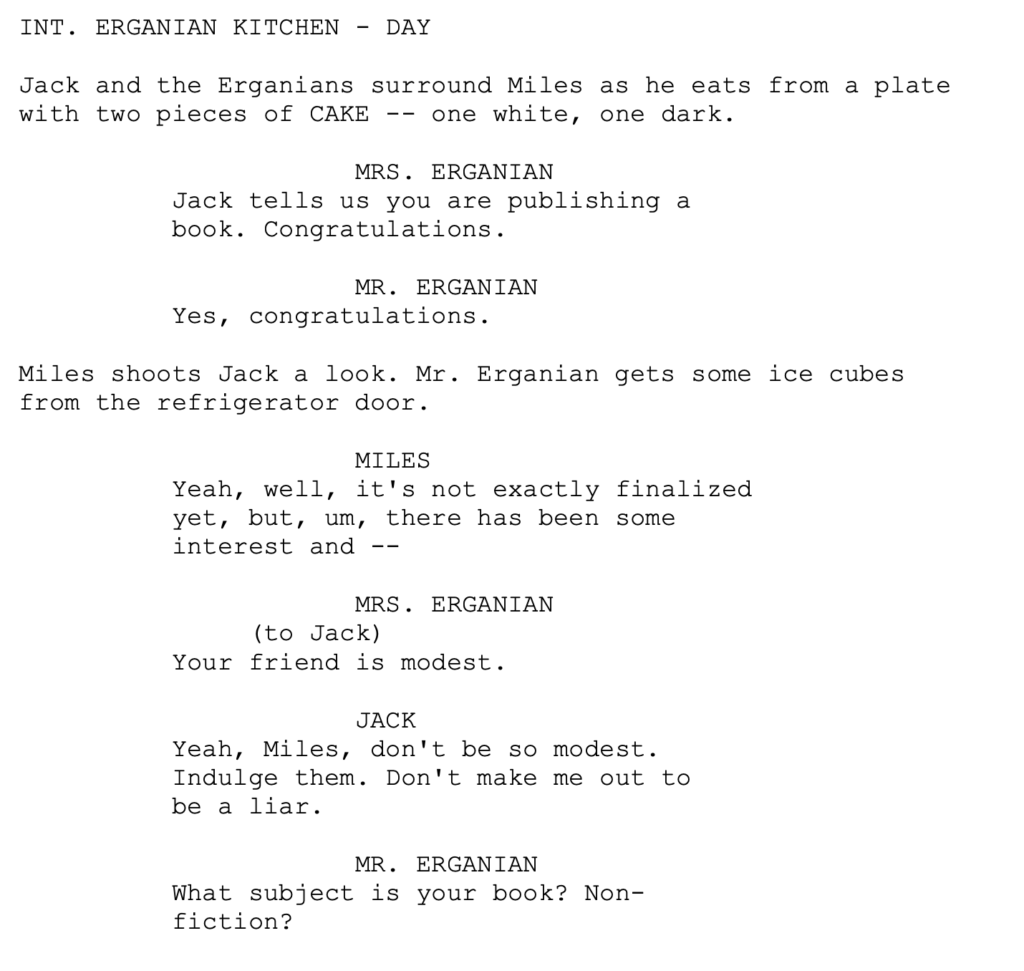
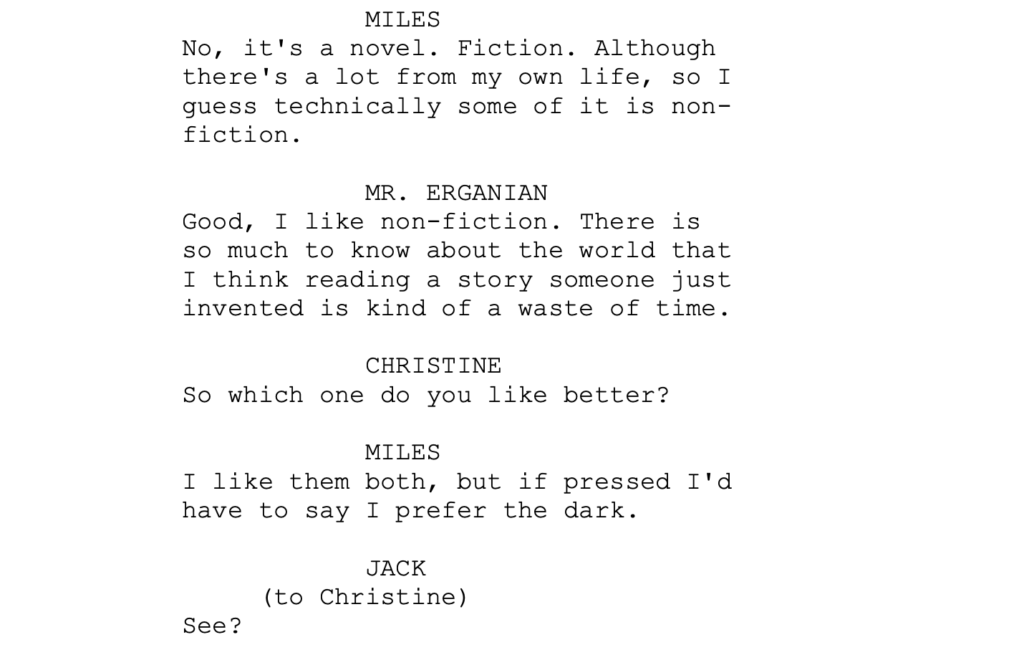
Then here’s another scene where Miles and Jack are having dinner with two women they recently met. Note how nobody really has a goal here. Sure, Jack wants to get laid and Miles likes Maya. But nobody has a specific goal in the scene. It’s basically just chit-chat.
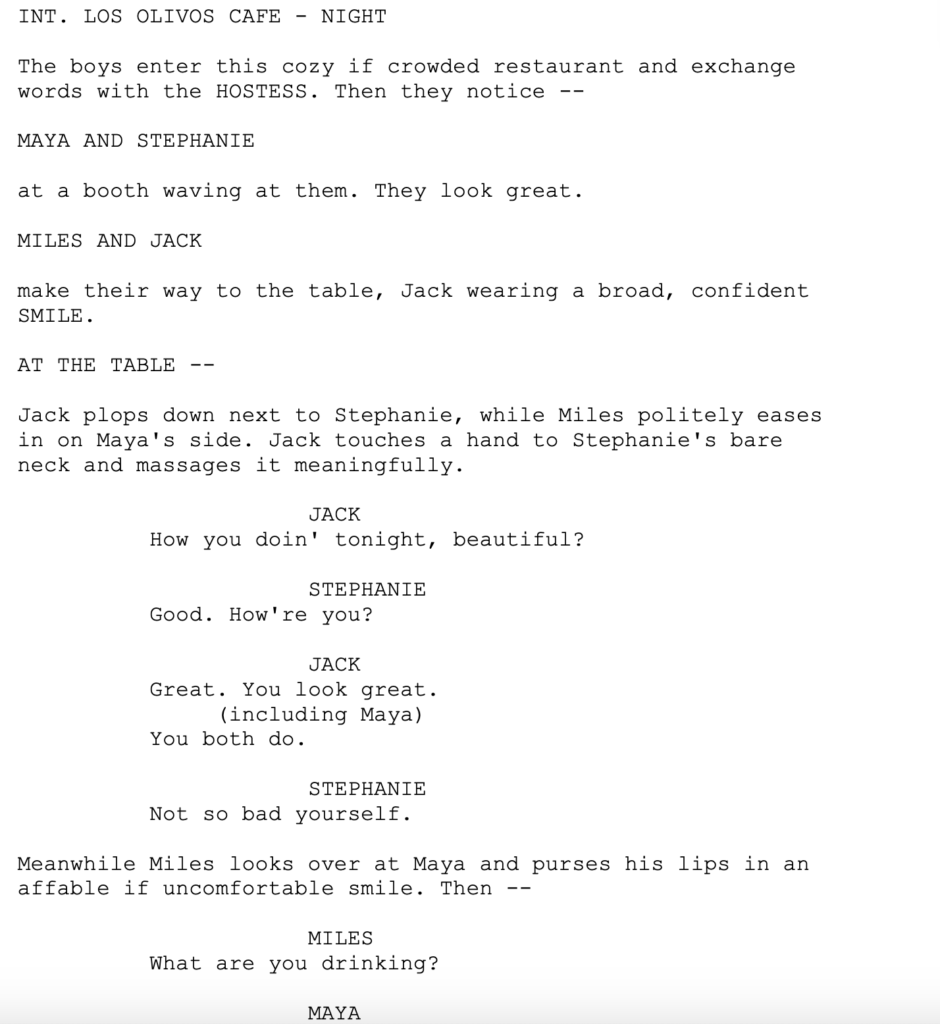
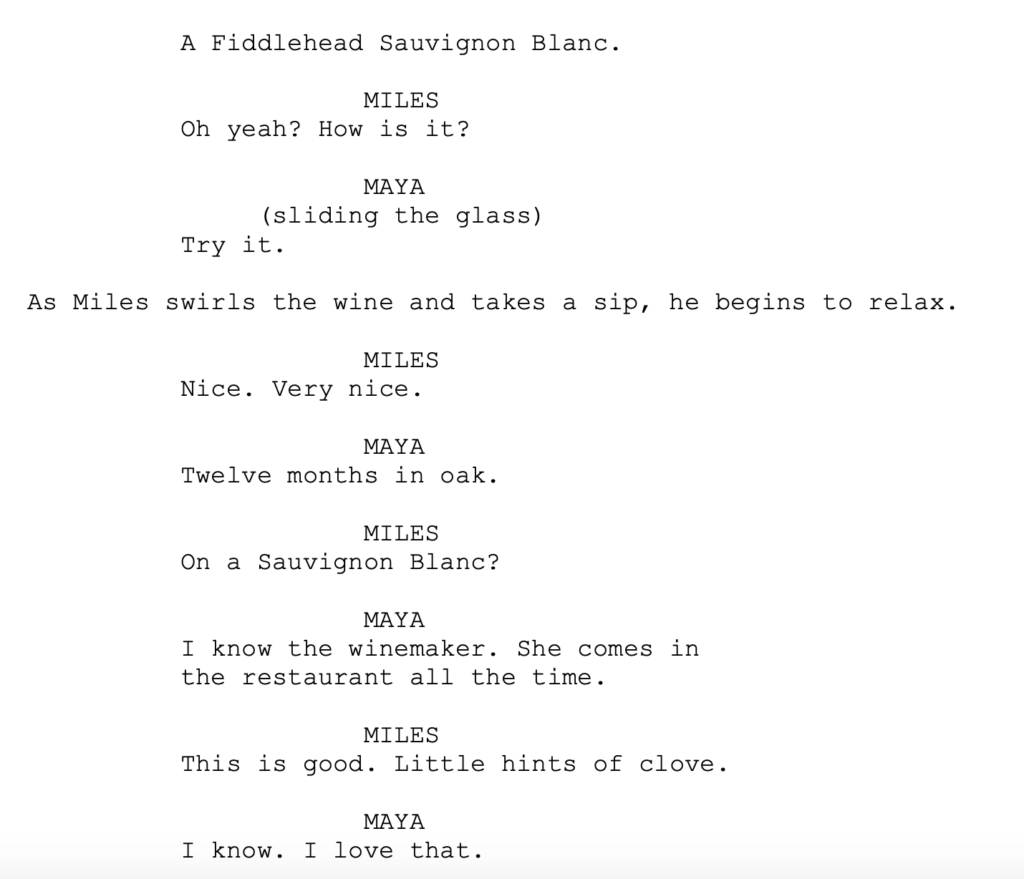
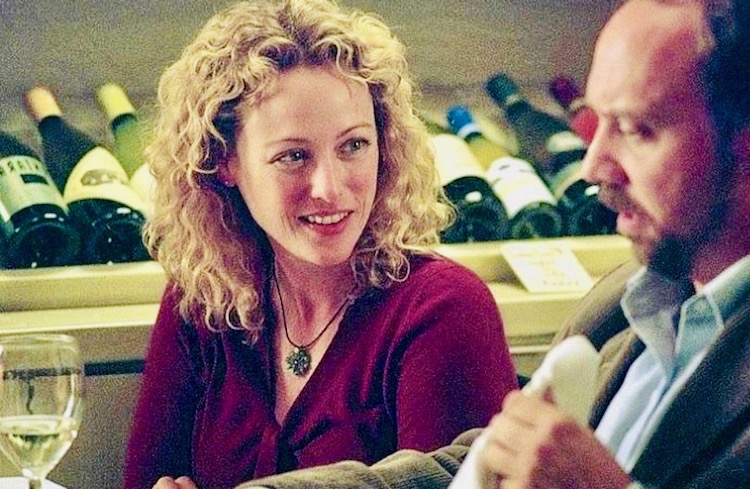
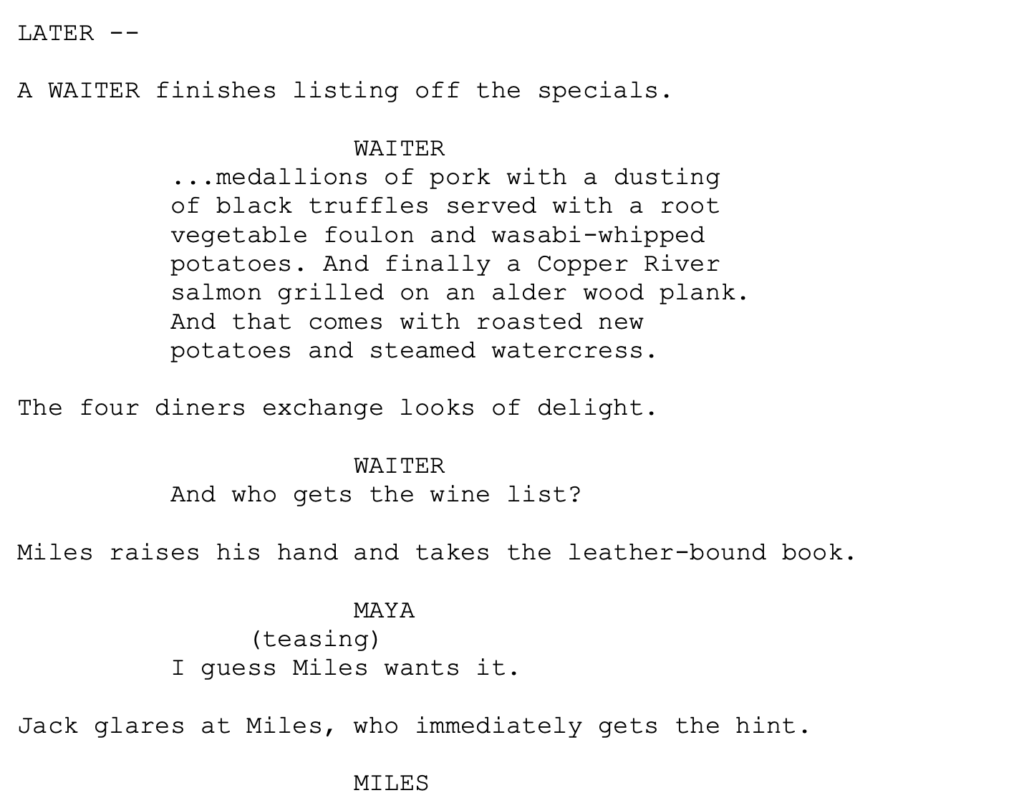
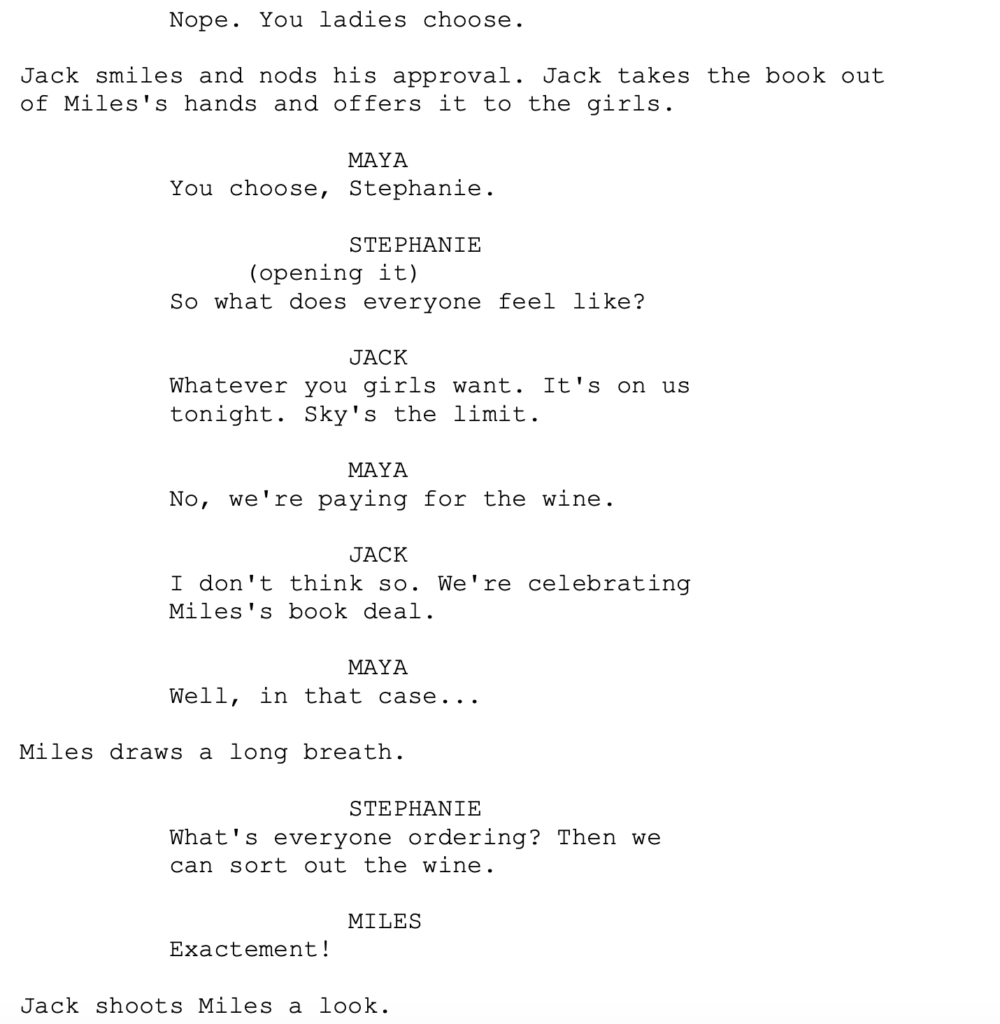
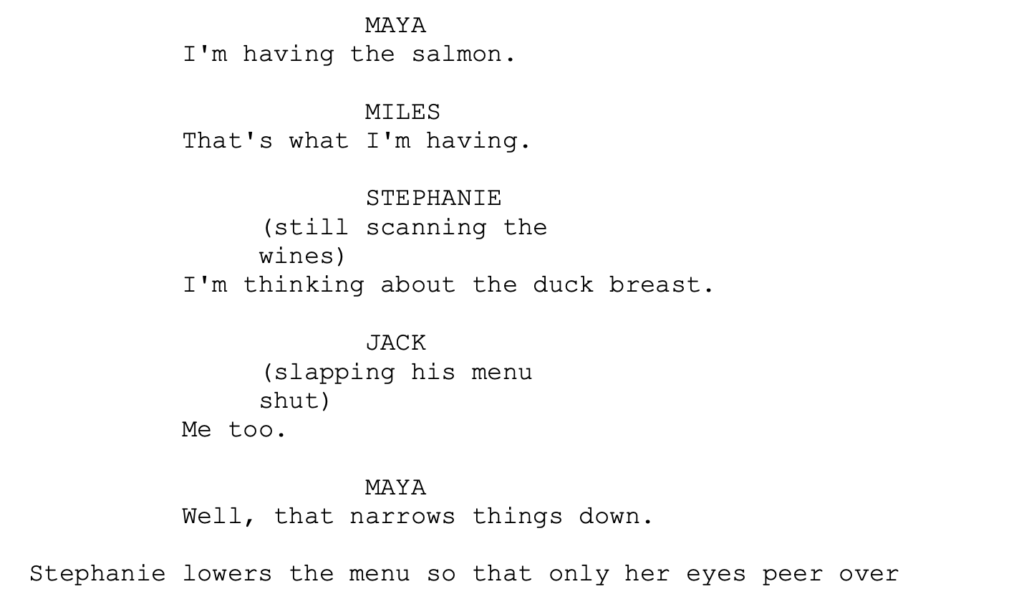
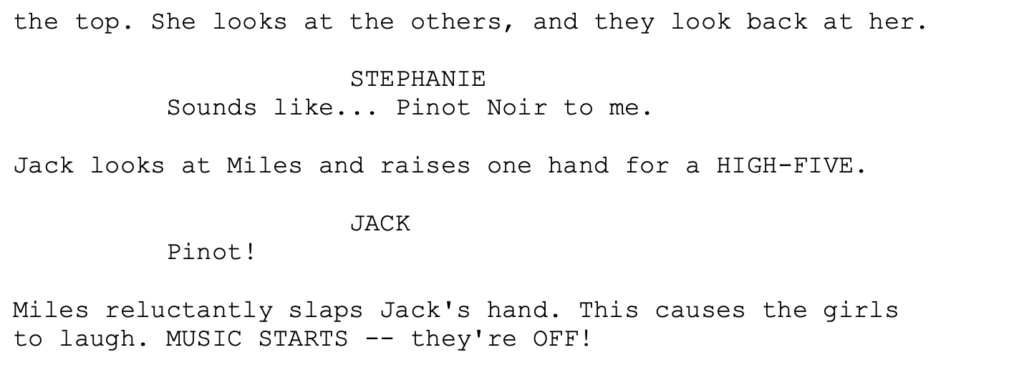
Some might say, “Well, the goal it to decide on what they’re going to eat.” Yeah but that’s not a real scene goal. Ordering in movies is inconsequential, as is the case here as well. Does it matter what they order? No. So it’s chit-chat. It’s the stuff you usually leave out in screenplays.
Now, to be fair, Sideways is a high-brow movie written for well-educated folks 40+ years old who live on the Upper West Side or Beverly Hills. And it’s an indie film. It’s not meant to pull you in and bombard you with drama every five minutes like a big-budget Hollywood film. So the rules are a little different.
With that said, the dialogue does work. It’s fun listening to these friends banter back and forth for two hours. So what’s going on? How is that happening?
There were a few things I learned.
First, I came to realize that the scene goals in indie films can be softer (or more subtle) than in mainstream films. They don’t need to be as big of a deal. So while in a Hollywood movie, the goal of a conversation might be to figure out how to defeat Vulture before he destroys the city, in an indie movie, the goal might simply be to teach another character how to taste wine.
I do think soft character goals in scenes are dangerous. They’re more likely to result in boring conversations. For example, go write your own scene where one character teaches another character how to taste wine. Just how entertaining can you make that dialogue? Especially when nothing’s at stake in the scene.
But a skilled dialogue writer has tools in their toolbox that you don’t yet have and, therefore, know how to navigate these softer scenes to still make the dialogue work.
That leads me to the second thing I discovered, which is that Payne did something long before any of his scenes were written that ensured the dialogue would be entertaining. He made Miles and Jack the most opposite of opposites ever. Miles is a pessimist. Miles’ marriage fell apart. Miles’ book is never getting published. He’s a bitter shell of a man. Jack, meanwhile, sees possibility in everything. He’s optimistic. He’s about to get married. He loves life and loves meeting people. They are polar opposites.
This ensures that even if Payne never once comes up with a scene that has a strong character goal and actual consequences, that the scene is still going to be entertaining on some level due to the fact that these two will never see eye-to-eye. Every conversation they have is going to have a push and pull to it.
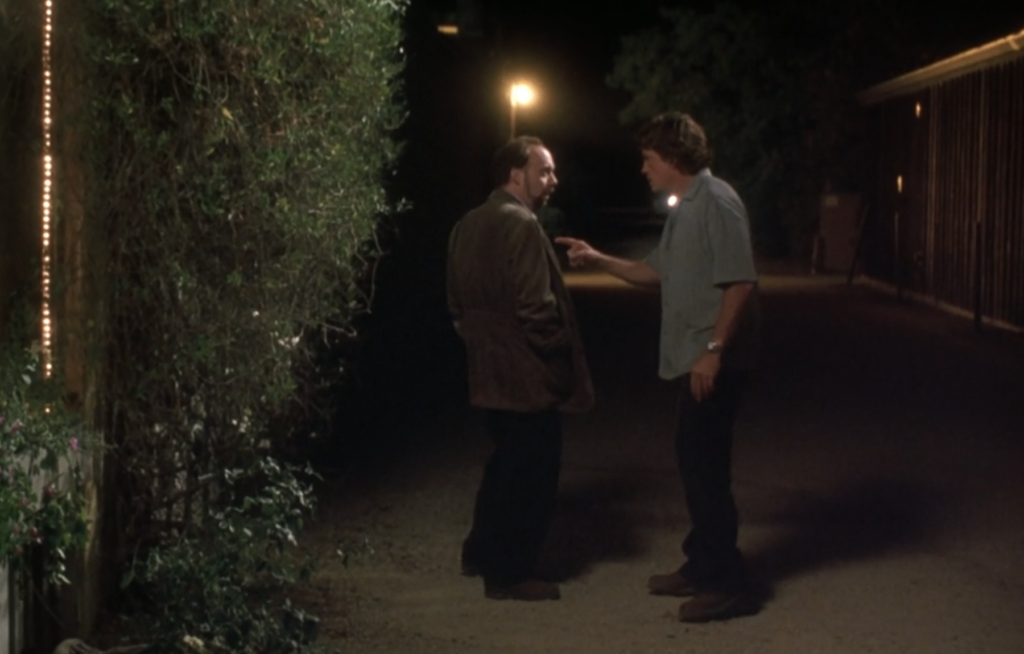
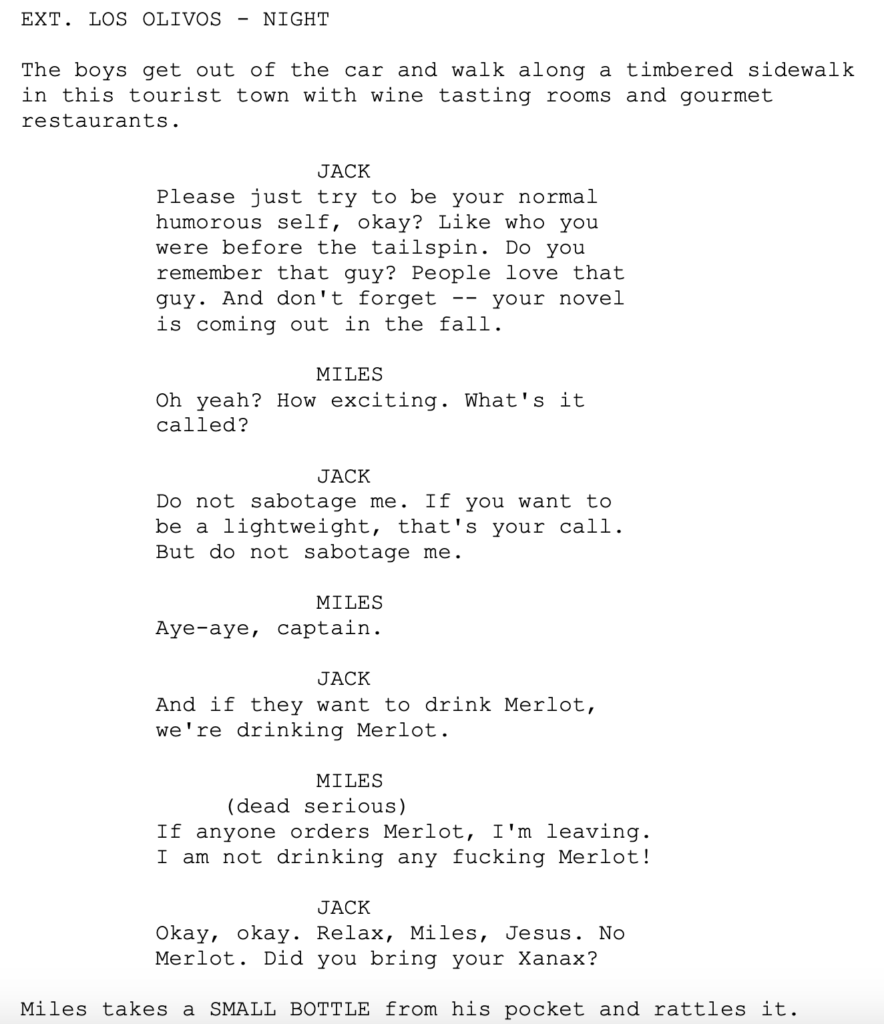
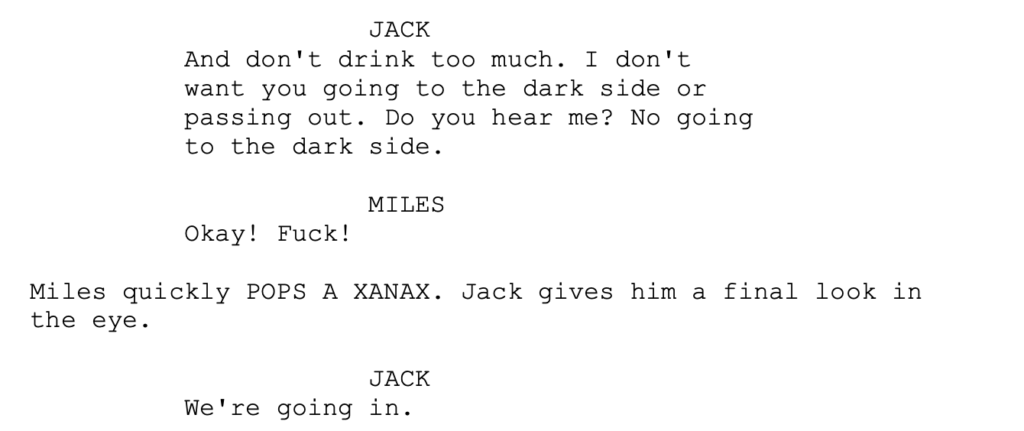
One of the key tenets of my book is, “Conflict solves all.” Because, if all else fails and you’re not doing many of the “proper” things needed to make your dialogue work, conflict can save you because when two people aren’t on the same page, there’s at least going to be some push and pull in the scene that will generate drama. And that’s what Payne so wisely does here. He bakes conflict into the Miles-Jack relationship from the start to ensure that, even when the plot isn’t humming, the conversations will still be entertaining.
Another thing I learned is that a character goal can be extended out beyond the immediate scene. So, in that scene above where the four characters are having dinner, Jack’s ultimate goal is to bed Stephanie. Originally, I was under the impression that dialogue goals needed to be scene specific. But, in this case, the goal is going to take several scenes and that’s okay. This is just the first of those scenes. Therefore Jack does, technically, have a goal. It’s just softer. It’s to establish sexual chemistry in order to get laid later on.
Finally, I learned that there are actually scenarios where nobody having a goal helps the dialogue. In the first scene that I posted, Miles doesn’t want to be talking to Jack’s in-laws. Jack’s in-laws don’t necessarily want to be talking to Miles. I guess they might be a little curious about him but they seem more focused on being polite than anything.
But that’s the reason the scene works. Because dialogue can be fun under awkward circumstances. The fact that nobody actually wants to speak is what makes the speaking fun. Cause we’ve all been in those situations. We’re stuck in a conversation we don’t want to be in and we just try and survive it. The desperate attempts to survive the conversation, wondering when the misery will be over, are what make it funny.
The more I study dialogue, the more complex I realize it is. But it’s really fun to keep learning this stuff and I can’t wait to share the book with you guys.
Also, a new newsletter is hitting your Inboxes this weekend! I’ll be reviewing a big-bugdget screenplay written by two of the biggest sci-fi screenwriters in Hollywood. I never knew these two teamed up on a script so I’m really excited to read it. So if you’re not already on the list, e-mail me at carsonreeves1@gmail.com to get on!
GET $100 OFF A SCRIPTSHADOW SCREENPLAY CONSULTATION! – I’ve read over 10,000 scripts. Done over 1000 consultations. I am the guy who can figure out the issues hampering your script AND HELP YOU FIX THEM so you can start doing better in contests, start getting more responses from queries, and start actually getting jobs in the industry! I have a 4 page notes package or a more detailed 8 page option designed to improve every aspect of your script, from your plot to your characters to your dialogue. I also give feedback on loglines (just $25!), outlines, synopses, first acts, or any aspect of screenwriting you need help with. If you’re interested, e-mail me at carsonreeves1@gmail.com and let’s set something up!
